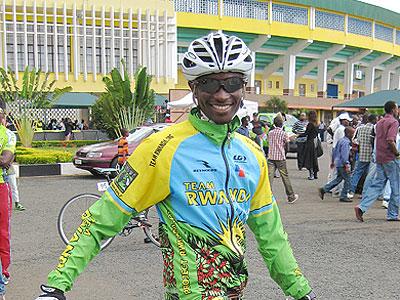As most athletes get closer and closer to the end of their careers, the reoccurring dilemma of what to do after they can no longer be competitive gets more and more apparent. For some, even more and more challenging and repugnant.


As most athletes get closer and closer to the end of their careers, the reoccurring dilemma of what to do after they can no longer be competitive gets more and more apparent. For some, even more and more challenging and repugnant.
In fact, right from the start of their careers, most athletes are already thinking of what they will do in retirement.
It is the same approach that the national cycling team, Team Rwanda Cycling, has sought to adopt over the years since its inception. Team Rwanda’s goal, away from nurturing raw cycling talent, has been to find ways to retain retiring athletes on the team, with a view to engaging their energies on the team’s other needs.
Team Rwanda Cycling coach, Jonathan "Jock” Boyer, says there are opportunities for ex-cyclists to curve out new career paths in coaching, cooking, nutrition, massage, administration and mechanics, among others.
"This would just strengthen the boys and their position on the team. I can’t push them to do things that they are not drawn to, so I let it happen naturally and leave opportunities open for them to take. My constant hope has always been that they would be the ones to replace myself, along with all those that have been part of setting up and keeping things going within Team Rwanda.”
The first step in that direction, according to Boyer, was to help all riders acquire a driving license at the very start. "We left it up to the motivated riders to sign up and do the driving classes and a few opted up on it. A driver’s license will assure them a job in this country no matter what happens to them.”
Bearing fruit
The first tangible fruit of the scheme has been one of the more popular cyclists on the team: his name is Obed Ruvogera. Last year, Obed was the very first among many riders to be integrated into the team after attaining retirement age from competition.
He is better known for, among others, emerging winner of the 2011 Ascension de Mille Collines Tour in Rwanda, and finishing second in last year’s Tour de Rwanda, which was won by the Belgian, Guy Smet.
Last year, at 28 years, Ruvogera tendered in his resignation from active cycling, but not after securing another berth on the team. Upon retirement, he became the first and only Rwandan to work with the riders as team masseur.
But how did a man that earned his professional glory from cycling end up in the massage business, one is wont to ask.
According to the cyclist, it all started last year, when a one Megan Leigh, a seasoned Yoga instructor from New York visited Musanze in the Northern Province, on a mission to teach local women Yoga.
Skilled in both Yoga and massage, Megan reached out to Team Rwanda Cycling and asked to teach Yoga to the cyclists too.
"Already, another volunteer named Kimberly had started giving instructions in Yoga within the team’s stretching and core exercises, so this was the best opportunity for us to learn from an expert,” Ruvogera says.
He took to yoga and massage at once, and from the very first lessons, it was evident that he was gifted not only in the exercises but more importantly understanding their importance and teaching them to the others.
"In a matter of days, I was conducting four-hour afternoon sessions after team rides. In the evenings I would go and teach fellow riders, and within a week I was able to teach a full one-hour class,” he recalls.
After he became well-versed in yoga instruction, Obed’s next step was to learn the art of massage, which he again easily did with the help of the American Megan before she flew back home.
Then his coach contacted one of the team masseurs who has a clinic and cycling team in South Africa, so that Obed could get more cycling-specific massage training and experience.
"Shortly after, before going into the Rio de Janeiro Tour in Brazil in August, last year, I travelled to the US and stayed for a month, learning yoga and massage therapy, under a programme dubbed ,"Players’ recycling process,” he says, adding that the programme had been designed with the express purpose of reducing the dependence (and costs) of using foreign therapists.
The rest, like they say, is history.
Obed has practically set the pace and is tangible proof that riders have an integral place on the team even when they are not racing.
What’s more, the team will no longer have to hire outside help when it goes international duty. Being a rider who already knows what pains and fatigue a rider suffers from most, Obed seems like the best possible choice as a masseur.
Most importantly, though, contends coach Boyer, "is the fact that he is Rwandan, meaning there will be no language barrier in dealing with fellow riders. Obed will also be the best person to start training in localy staff for this important element of sports.”
Boyer talks from experience when he raises the issue of language barrier. The first American to ride in the Tour de France in 1981, he came to Rwanda in 2006 to assist with a local race. At the race, he spotted amazing potential in the local athletes, and in February 2007, he moved in to the country to lend his expertise to Team Rwanda Cycling.


